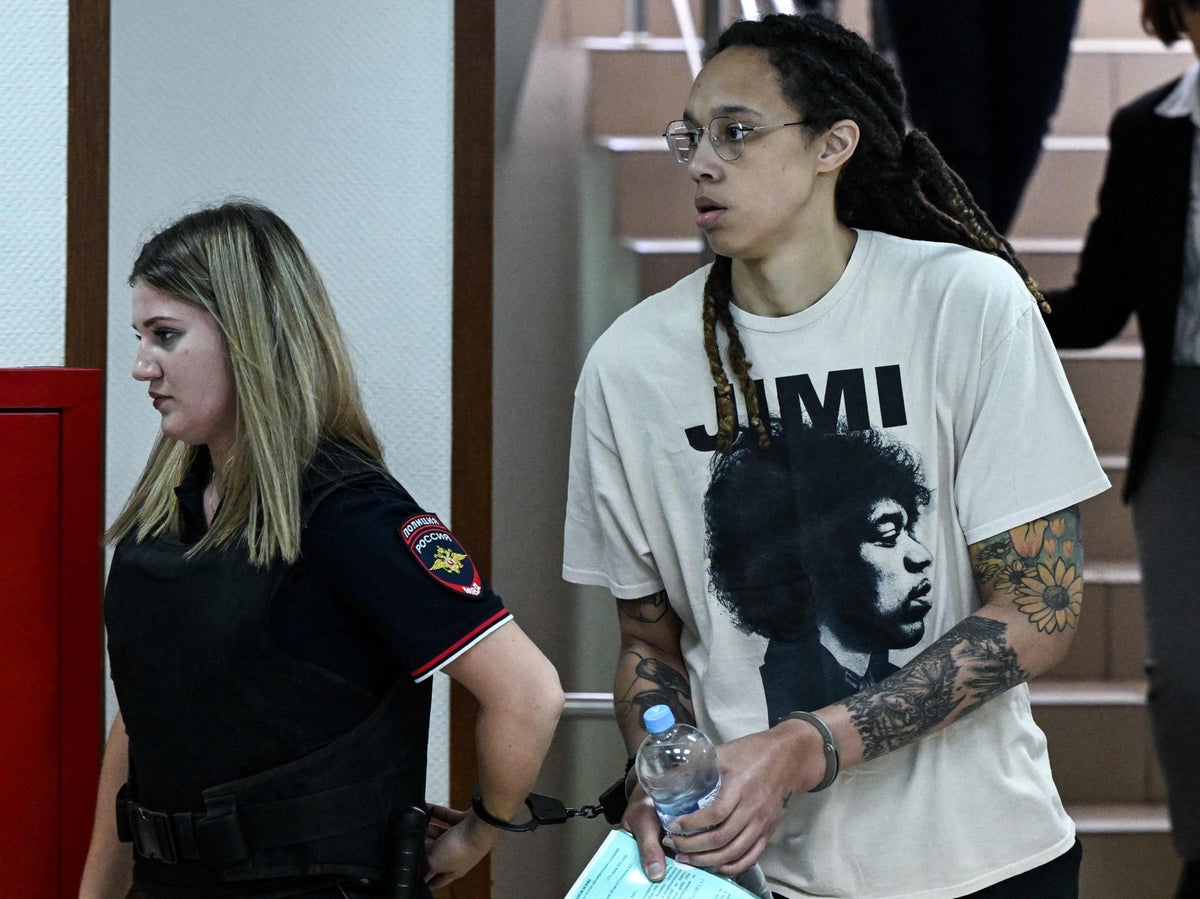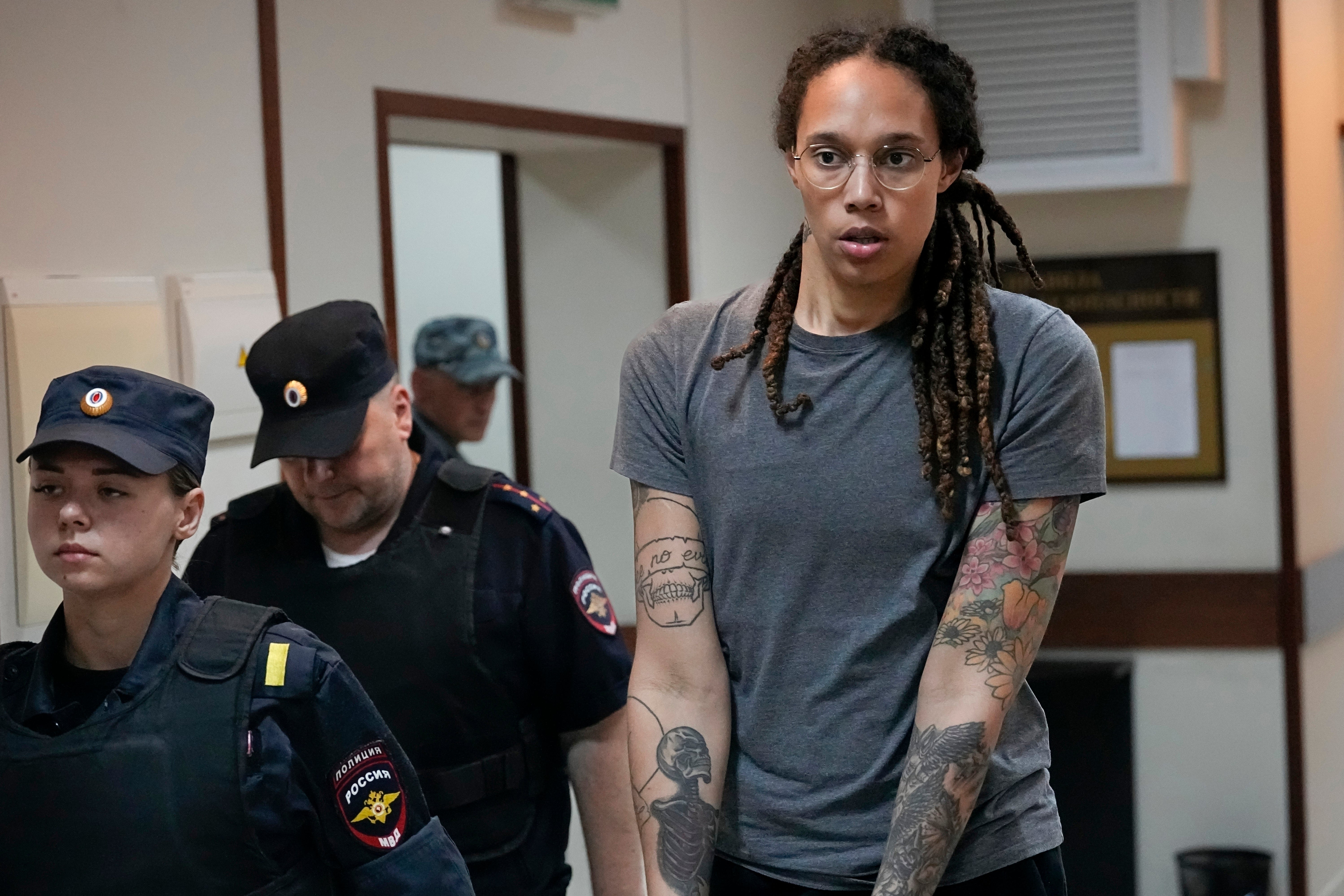
WNBA star Brittney Griner has finally been freed from Russian prison after US officials negotiated a prisoner swap with Moscow for notorious arms dealer Viktor Bout.
US officials revealed on Thursday that, following weeks of negotiations, a one-for-one swap had been carried out, exchanging the 32-year-old American basketball star for Bout.
Ms Griner’s family, friends and fans – alongside many public figures – have been calling on Russia to free her for months and for the US State Department to intervene.
The WNBA star has spent the last 10 months in prison in Russia after she was detained at an airport back in February.
According to the Russians, Griner allegedly packed hashish oil in her bag, likely in the form of a vape.
It was that discovery that led to her nine-year sentence, after Griner pleaded guilty in July to charges of smuggling less than a gram of hash oil.
What is hash oil?
Hashish — also known as hash — is a drug made by compressing the parts of a cannabis plant that contains the highest levels of THC. Hash is traditionally associated with Middle Eastern and and Mediterranean cultures, but has been used globally for decades.
Hash oil is, predictably, an "oil" version of hash. The term "oil" refers to the concentrated liquid that is formed when cannabinoids are extracted from the cannabis plant. Consumers usually smoke — or more recently vape — the liquid. Hash oil is available in cartridges and vapes, similar to THC pens and common nicotine vapes.
Is hash oil legal in the US or Russia?
In the US, hash and hash oil — like marijuana — are Schedule 1 drugs. It's still illegal to use and possess hash under federal law, and its legality varies state by state.
In Russia, cannabis is illegal. An individual possessing less than 6 grams of cannabis or two grams of hash can be fined or jailed for up to 15 days. Possessing any more than that becomes a more serious criminal offense.
Griner was accused of having less than a gram.
“Being sufficiently aware that the movement of narcotic drugs is not allowed… no later than February 17, 2022 at an unspecified location under unspecified circumstances from an unidentified person [Ms Griner] bought two cartridges for personal use, which contained 0.252 grams and 0.45 grams of hash oil, totaling 0.702 grams,” the prosecutor said during the trial, TASS reported.
US officials worried that Griner's arrest was partially politically motivated, providing Russia with a bargaining chip at a time when it and the US are at odds over the war in Ukraine. The Kremlin roundly denied those allegations, arguing that it was simply enforcing its nation’s narcotics laws.
What happened to the WNBA star?
Ms Griner’s trial began on 1 July with the Russian government presenting evidence that the WNBA star “bought two cartridges for personal use, which contained 0.252 grams and 0.45 grams of hash oil”.
The trial resumed on 7 July, with Ms Griner clutching a photo of her wife Cherelle.
Ms Griner pleaded guilty to the charges.
“I’d like to plead guilty, your honour. But there was no intent. I didn’t want to break the law,” Ms Griner said, speaking English which was then translated into Russian for the court.
“I’d like to give my testimony later. I need time to prepare.”

In early August, Ms Griner was sentenced to nine years behind bars. She filed an appeal of her conviction, which was taken up at a hearing on 25 October. At that appeal, a Russian court upheld their sentence with a prosecutor calling it “fair.”
On 17 November, Griner was relocated to a penal colony in Mordovia, about 350 kilometers (210 miles) east of Moscow.
“Brittney is doing as well as could be expected and trying to stay strong as she adapts to a new environment,” her lawyers said in a statement.
Ms Griner’s lawyer, Alexandr Boykov, toldThe New York Times that his client “has not been in as good condition as I could sometimes find her in” in recent weeks.
Her release
Supporters of Ms Griner, alongside her family and friends, called for her release for months.
On Thursday (8 December), US officials confirmed that Ms Griner had finally been released in a prisoner exchange for Russian arms dealer Viktor Bout.
Washington and Moscow had been negotiating the one-for-one swap for several weeks, before Mr Biden gave the final sign-off over the last week. The exchange took place in the United Arab Emirates on Thursday.
Paul Whelan, a US marine who was also expected to be part of a prisoner exchange with Russia, remains behind bars.
In a press briefing in the White House, Ms Griner’s wife celebrated the news of her release while Mr Biden vowed that the US has “not forgotten” about Mr Whelan.
“We have not forgotten about Paul Whelan. This was not a choice about which American to release. Russia is treating Paul’s case differently … we are not giving up,” he said.







